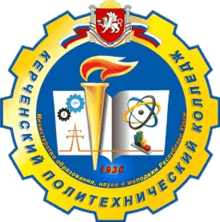Kerch Polytechnic College
Kerch Polytechnic College (Russian: Керченский политехнический колледж, romanized: Kerchenskiy politekhnicheskiy kolledzh) is a higher education institution in Kerch, Crimea. It trains personnel in 16 specialties, and about 300 students enroll for first-year studies at the college annually.[2]
Керченский политехнический колледж | |
 Coat of arms | |
Former name | Kerch Mining and Smelting Tekhnikum |
|---|---|
| Type | Public |
| Established | 1930 |
| Director | Olga Grebennikova[1] |
| Location | 45°21′23″N 36°32′08″E |
| Website | kerchpoliteh |
History
It was established in 1930 as Kerch Mining and Smelting Tekhnikum (Russian: Керченский горно-металлургический техникум) to support the Kamysh-Burun Iron Ore Plant and the Voykov Metals Factory.[3] Having trained about a thousand graduates by the time of the German invasion in 1941, the tekhnikum was eventually evacuated to the Urals to later return to Kerch in 1945. Thereafter, it produced various specialists to work in metallurgical regions of Ukraine and at the Ministry of Ferrous Metallurgy of the USSR, remaining the sole special secondary educational institution in the city until 1952.
The tekhnikum changed its profile and became a polytechnic in 1990. In 2011, it has been reorganized into Kerch Polytechnic College of the National University of Food Technologies (Ukrainian: Керченський політехнічний коледж Національного університету харчових технологій).[4]
Shortly after the annexation of Crimea by Russia, the college was nationalized under Order of the State Council of Crimea on 11 April 2014.[5] On 7 April 2015, the Museum of Battle Glory was opened at the college on the initiative of its tutor Vitaly Nekrasov.[6] The Kerch Tekhnikum of Service Industry (found in 1925) was merged with Kerch Polytechnic College in 2016.[4]
On 17 October 2018, it was the site of the Kerch Polytechnic College massacre, in which 20 people were killed and 70 injured. The perpetrator committed suicide at the scene.[7]
Notable alumni
- Anatoly Kokorin (1921–1943) – Hero of the Soviet Union, junior lieutenant.[8]
- Ivan Gerashchenko (1920–1945) – Hero of the Soviet Union, sergeant.[8]
References
- "Руководитель образовательного учреждения". kerchpoliteh.ru (in Russian). Retrieved 2018-10-17.
- "Students among most victims of Kerch college blast — Crimean ombudswoman". TASS. Retrieved 2018-10-17.
- "История колледжа". kerchpoliteh.ru (in Russian). Retrieved 2018-10-17.
- "Керченский политехнический колледж. Досье" (in Russian). TASS. Retrieved 2018-10-19.
- "Постановление Государственного Совета Республики Крым от 11.04.2014 г. № 2042-6/14 «О национализации учебных заведений, научных, научно-технических, научно-исследовательских учреждений, предприятий, расположенных на территории Республики Крым»". crimea.gov.ru (in Russian). 2014-04-24. Retrieved 2018-10-19.
- "Музей боевой славы". kerchpoliteh.ru (in Russian). Retrieved 2018-10-19.
- Hodge, Nathan; Burrows, Emma; Tarasova, Darya; Britton, Bianca (18 October 2018). "20 killed in Crimea college gun and bomb attack, Russia says". CNN. Retrieved 2018-10-19.
- "Наши выпускники - Герои Советского Союза". kerchpoliteh.ru (in Russian). Retrieved 2018-10-19.